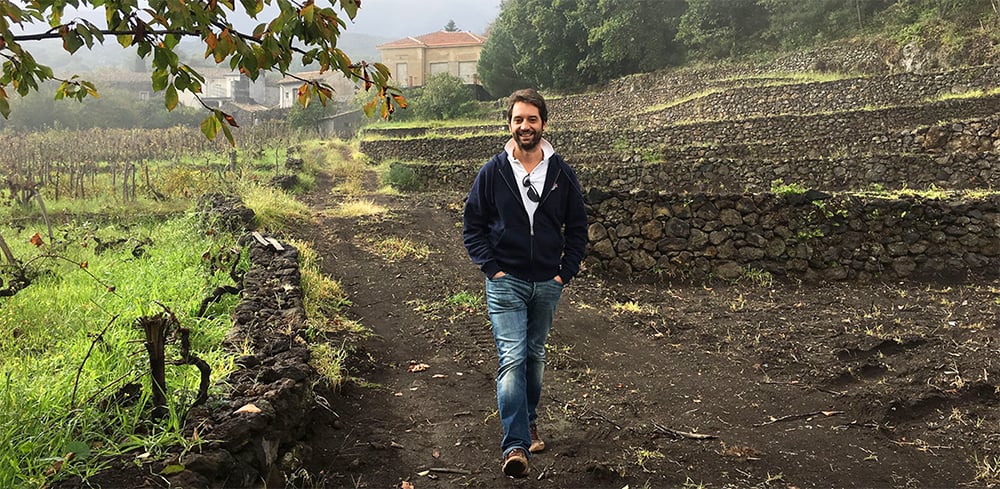Robert Camuto: Letter from Europe
Winespectator, post Jan 23, 2017
Twin brothers Salvino and Antonio Benanti, 42, have spent their lives side by side: growing up in Sicily, studying at business school, working banking jobs in London and then returning to Sicily to take over the family winery.
In 2012, their father, Giuseppe, handed them Benanti, one of the most important precursors for quality wineries in the now-fashionable region of Mount Etna, on the slopes of the island’s volcano. At the time, Benanti had lost some of its identity, producing too many wines of varying quality. The brothers knew what they wanted to do and wasted no time.
“The day after our father transferred ownership to us, we started implementing our brutal refocusing program,” Salvino says.
Brutal? Over the protests of their father, the brothers sold off vineyards in southeastern Sicily along with mediocre performers on Etna, dramatically slashed the number of bottlings from more than 20 to eight, and eliminated use of international varieties.
“Our idea is to invest in our core wines,” says Salvino. Those that Benanti does best are its elegant, single-vineyard Etna \agships, including the Etna White Superiore Pietramarina (2012, 91 points, $50), made from the ancient native variety Carricante, and two reds—the Etna Rovittello (2012, 90 points $46) and Serra della Contessa (2012, 91 points, $50)—made from local grapes Nerello Mascalese and Nerello Cappuccio.
Standing in the fog amid the terraced vines on Etna’s sea-facing eastern slopes from which they make Pietramarina, Salvino adds, “We want to be in the right places with the right vineyards.”
The Benantis are now expanding from the original 3.5 acres of 80-year-old vines used to produce Pietramarina. This winter, they will plant another 6 acres on adjacent abandoned plots that they purchased and cleared. They plan to use fruit from the new vines for Pietramarina beginning in 2025.
Similarly, on Etna’s cooler north face, the brothers are expanding from the 2 acres of old vines used for the Etna Rovittello to neighboring vineyards. Grapes from the original vineyard will go into a longer-aged Rovittello Riserva.
Benanti began as the hobby of wine-loving Giuseppe Benanti, now 71, a third- generation Catania pharmacist who built a successful international ophthalmological products company. He saw Sicily, and Mount Etna in
particular, as not living up to their viticultural potential. In the late 1980s, he began investing in a dream of making great wines.
Benanti employed a talented young Sicilian enologist, Salvo Foti, and the two began experimenting with international varieties, such as Chardonnay and Cabernet Sauvignon, as well as local grapes. “They were experimenting almost from scratch,” says Salvino. “My father didn’t have a plan.”
From their frst vintage of Pietramarina, 1990 (released in 1994 under the Tenuta di Castiglione label), the fresh, salty, complex white—unique on Sicily— was a hit in Italy.
Benanti’s success garnered lots of attention and free advice. The legendary Italian enologist Giacomo Tachis counseled him to “plant Pinot Noir everywhere.” Results from Pinot Noir were not stellar; the last of Benanti’s Pinot vines will be pulled out this winter.
“Although my father was an early mover on Etna, he was perhaps too early a mover,” says Salvino, trim, with dark eyes, hair and beard—the same good looks of his father and brother. “My father didn’t always buy the best vineyards. He bought what was available at the time.”
Another mistake, the twins say, was expanding outside of Etna, just as critics and consumers were recognizing it. “While others were following my father’s footsteps on Etna,” says Salvino, “he was looking elsewhere.”
A decade ago, the elder Benanti bought land in southeastern Sicily, where he planted more than 60 acres of Nero d’Avola and international varieties. The brothers sold those vineyards three years ago to help fnance Benanti’s consolidation on Etna.
Today the winery farms about 30 acres, producing close to 13,000 cases annually. For the past three years, Foti’s protégé, Enzo Calì, has led the winemaking.
The changes seem to be working. Benanti wines—which fve years ago were exported only to Japan, Norway and one U.S. state—now ship to 30 countries. American distribution has expanded from New York only to 11 other states. At the same time, the company’s books have moved for the frst time from the red into the black.
“My father created this purely out of passion. It was romantic, but it lacked focus,” says Salvino. “It is important to be driven by passion, but for sustainability and the future—and for my 1-year-old son—it’s important we are proftable as well.”
www.winespectator.com/blogs/show/id/Benanti-Sicily-Italy-Wine-Camuto




